Sessions and Chairs
Conference Chairs:
Dr. Adeyemi Adeleye, University of California-Irvine and
Dr. Appala Raju Badireddy, University of Vermont- Burlington

Adeyemi Adeleye

Appala Raju Badireddy
Dr. Adeleye’s research cuts across multiple disciplines, including environmental chemistry, material science, environmental engineering, and environmental nanotechnology. He is interested in developing recoverable nanoscale materials for extracting heavy metals from cultivated soils, precious metal recovery, and fate and effects of per-and poly-fluoroalkyl substances (PFAS). Before joining UC Irvine, he was a National Research Council (NRC) research associate at the US Environmental Protection Agency’s (EPA) National Health and Environmental Effects Research Laboratory (NHEERL) in Narragansett, RI. Prior to that, he worked as a researcher at the University of California Center for Environmental Implications of Nanotechnology, first as a graduate student researcher and later as a postdoctoral scholar
Dr. Badireddy conducts interdisciplinary research on sustainable membrane processes with the focus on water & wastewater treatment, and resource recovery, environmental nanotechnology with the focus on applications and implications of engineered nanomaterials, and nanometrology with the focus on developing enhanced darkfield-hyperspectral imaging (ED-HSI) microscopy methods for detection and quantification of engineered nanomaterials and co-contaminants in environmental and biological matrices. His latest projects include studies on fate and transport of per-and poly-fluoroalkyl substances (PFAS) in environmental systems, development of green nanomaterials and nano/membrane composites for PFAS remediation, innovative membrane anti-fouling strategies, bio-electrochemistry in biofilms on natural and engineered surfaces, and phosphorus removal and recovery strategies.
Sessions
Tribute to Jorge Gardea-Torresdey
Session Chairs: Dr. Arturo Keller, University of California-Santa Barbara, and Dr. Jason C. White, Connecticut Agricultural Experiment Station-New Haven

Jorge Gardea-Torresdey
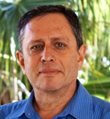
Arturo Keller

Jason White
This session will be honoring the many scientific contributions of Dr. Jorge Gardea-Torresdey. Dr. Gardea-Torresdey is the Richard Dudley Professor of Environmental Science & Engineering and Professor of Chemistry at The University of Texas at El Paso (UTEP). Dr. Gardea-Torresdey received his Ph.D. in Environmental Chemistry from New Mexico State University in 1988 and joined UTEP in January of 1994. Since then he has built an incredible research program focused on the environmental implications and applications of nanotechnology, sustainable nano-enabled agriculture, and on development and applications of spectroscopic methods in environmental chemistry and nanotechnology. He is a world leader in environmental nanotechnology and key investigator in major multi-institution NSF, EPA, and USDA research centers on nanotechnology.
The scientific contributions of Dr. Gardea-Torresdey have allowed him to receive many honors throughout his professional life. Among other awards, he has received the UTEP’s Graduate Mentor Award (2016), the 2009 SACNAS Distinguished Scientist of the Year Award, and the 2012 Piper Professor Award, which is one of the most prestigious honors conferred to a professor in the State of Texas. He received the distinguished 2018 University of Texas System’s STARs Retention Award. He has graduated 47 PhD Students and 37 students have received their M.Sc. degrees under his mentorship. He served as an Editor of the Journal of Hazardous Materials from 2007 to 2010. Since 2011, he is an Associate Editor of Environmental Science &Technology.
The session chairs are inviting poster and platform abstracts from all former and current students, collaborators and colleagues of our good friend Jorge. The session will encompass all aspects of environmental nanotechnology, nanotoxicology, and nano-enabled agriculture and water treatment.
Nano-Bioeconomy (Agriculture, Energy, Food, and the Allied)
Session Co-Chairs: Dr. Swadeshmukul Santra, University of Central Florida-Orlando, and Dr. Christian Dimkpa, The Connecticut Agricultural Experiment Station-New Haven

Chris Dimkpa
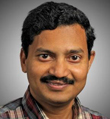
Swadeshmukul Santra
Nanotechnology applications continue to add value to numerous aspects of human life. Several advances have been recorded in the specific area of nano-agriculture that can change how crop production and food systems are challenged by diverse factors, including climate, environment, biotic events, and human management. The session on nano bioeconomy covers a wide range of discussion topics from agriculture, energy, food, and their nexus with nanotechnology. Specific topics within the scope of the session includes materials for sustainable development of nano-enabled product, including fertilizers, pesticides, and sensors among others; advanced analytical tools for understanding nanomaterial interaction in soil-plant-food systems; agrochemical pollution (nitrogen, phosphorus and others) reduction using nanoscale strategies; mitigation of plant disease stress and pest infestations with nanomaterials; facilitating crop quality and yield; use of nano-scale sensors to predict, identify and mitigate external abiotic and biotic perturbations to agriculture and agroecosystems; and nanoscale strategies for food safety, including food preservation against post-harvest pathogens and pests. As the need for cleaner production systems continue to gain traction, the green synthesis of nanoparticles using plant and microbially derived molecules (enzymes and reductants) and their application in agriculture and the management of the environment have been brought to the fore. Topics here will explore the biogenic synthesis of nanomaterials and the nano-enablement of conventional materials using nanoscale biomaterials. The energy saving potentials of such green systems will also be discussed. Importantly, the regulatory aspects of nanotechnology application in agriculture and food systems, as well as the cost and benefit analysis of such nanoscale systems to meet some aspects of industry feasibility will be covered.
NanoMedicine
Session Chairs: Dr. Tian Xia, University of California-Los Angeles and Dr. Huan Meng, National Center for Nanoscience and Technology-Beijing
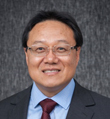
Tian Xia

Huan Meng
Nanomedicine holds immense potential to transform diagnosis, treatment, and prevention of diseases. By harnessing the unique properties of materials at the nanoscale, scientists and clinicians are unlocking a new era of personalized and precise healthcare, paving the way for remarkable advancements in medical science. This session serves as a platform for collaboration and knowledge exchange among experts from various disciplines, including nanotechnology, biotechnology, pharmaceuticals, and clinical medicine. During the course of this session, we will explore a multitude of topics, ranging from drug delivery systems, nanotherapeutics, nanoapplications, and nanodiagnostics. We strongly encourage the discussion about translational nanomedicine. As we embark on this journey, we encourage you to engage in vibrant discussions, share your valuable insights, and forge new connections with like-minded professionals. Together, let us delve into the realm of nanomedicine, where innovation and discovery hold the potential to redefine the landscape of healthcare and improve countless lives around the world.
NanoPolymers (all applications)
Session Chairs: Dr. Mariya Khodakovskaya, University of Arkansas-Little Rock, and Dr. Mohiuddin Quadir, North Dakota State University-Fargo
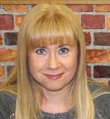
Dr. Mariya Khodakovskaya
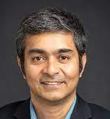
Mohiuddin Quadir
Biodegradable, biocompatible nano-polymers such as certain polysaccharides, lipids, poly(D, L-lactide-co-glycolide) (PLGA), polylactide (PLA), and others are described as safe alternatives to engineered nanomaterials used in a wide range of applications. This session will highlight the latest advances in understanding the interactions between cells/organisms/ecological components and sustainable polymeric materials. Talks will cover themes related to biological effects of naturally derived and synthetic polymeric nanoparticles, novel applications of such nanomaterials for medicine, agriculture, the food industry, and biotechnology. Possible risks associated with polymeric nanomaterials being in the environment and food chain will be also discussed.
Nano for Energy, Water Infrastructure, and the Environment
Session Chairs: Dr. Nirupam Aich, University of Nebraska-Lincoln, and Dr. Tonoy K. Das, University of California-Los Angeles
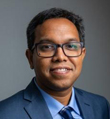
Nirupam Aich
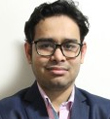
Tonoy K. Das
This session will comprise of talks on a broad range of topics to include the applications of nanotechnology and nanomaterials for the energy, water, and environmental sustainability. The topics will include, but not limit to: advanced nanomaterials and processes for renewable energy generation, novel materials and catalysts for water and gas pollutant adsorption or degradation, nanocomposite membranes for water and gas separations, emerging and legacy pollution (e.g., per- and polyfluoroalkyl substances or PFAS) remediation and treatment, and nanomaterials for microbial disinfection (e.g., bacteria and viruses). Nanotechnology applications for addressing emerging contaminants and field applications of technology for energy, water, and the environment are of particular interest for the session.
NanoEducation
Session Chair: Deb Newberry, Newberry Technology Associates

Deb Newberry
NanoEducation and associated research are rapidly developing and evolving. Educators and educational institutions are looking for new ways to teach nanotechnology as a stand-alone discipline and by integrating nanoscale concepts into traditional classes. The breadth and depth of nanotechnology as well as the multi-disciplinary and market impact pose substantial challenges for educators at all levels. This session will focus on sharing the successes as well as the challenges from existing programs and also serves as a forum for discussion on new ideas and approaches, and, of course, offer opportunities for networking. The session will explore different strategies to include nanotechnology and sustainability in course curricula. We will also talk on how nanotechnology can be used for outreach programs. We would also like to dwell on the correlation of education content and student outcomes as they relate to employer requirements in developing the needed workforce for the future. Abstracts for presentations on any of the above areas and beyond are welcome.
NanoSensors
Session Chairs: Dr. Omowunmi Sadik, and Dr. Manavi, New Jersey Institute of Technology

Wunmi Sadik

Manavi
Nanosensors have gained significant attention in various fields due to their potential applications in areas such as healthcare, environmental monitoring, food safety, and security. With the advancement in Artificial Intelligence, nano-sensors and associated technologies has paved the path for numerous futuristic applications in almost all fields. While nanosensors hold great potential, there are challenges to address, such as scalability, cost-effectiveness, and safety considerations. Nonetheless, ongoing research and development in nanotechnology continue to advance the field of nanosensors, opening up new possibilities for diverse applications. The Nanosensors Session aims to provide a platform for researchers, scientists, and industry professionals to present and discuss the latest advancements, discoveries, and applications in the field of nanosensors. Your expertise and contributions would greatly enrich the session and contribute to its success. We welcome abstracts that cover a wide range of topics related to nanosensors, including but not limited to: chemical nanosensors, biological nanosensors, physical nanosensors, novel nanosensor materials and fabrication techniques, applications in healthcare, environmental monitoring, food safety, and security, advances in characterization and sensing technologies, and Integration of nanosensors with other systems or devices. We are confident that this session will foster valuable discussions, collaborations, and knowledge exchange among the participants. Selected abstracts will have the opportunity for oral or poster presentations, providing a platform to showcase your work to a diverse audience of experts in the field.
Fate, Transport and Exposure
Session Chairs: Dr. Candace Tsai, University of California-Los Angeles, and Dr. Stacey Louie, University of Houston
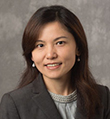
Candace Tsai, UCLA

Stacey Louie
The session invites abstracts on research that explores topics relevant to the fate and transport of natural, incidental, and engineered nanoparticles – including nanomaterials of emerging interest, such as nanoplastics and viruses (e.g., SARS-CoV-2) – in natural and built environments. Topics in nanoparticle transport include migration and assessment of nanoparticles in air, water, and soil causing human and environmental exposure. Fate studies include nanoparticle transformations and surface interactions in environmental and biological samples. This session will share state-of-the-art experimental and modeling efforts to answer mechanistic questions about nanomaterial fate and transport.
NanoClimate Actions
Session Chairs: Dr. Xing Xie, Georgia Tech, and Dr. Fudong Liu, University of Central Florida
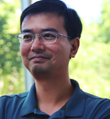
Xing Xie

Fudong Liu
We invite researchers, scientists, and innovators to contribute to the special session focused on harnessing the power of nanotechnology to combat climate change. As climate-related challenges continue to escalate, it is imperative to explore groundbreaking solutions. This session aims to showcase cutting-edge research and applications of nanotechnology that have the potential to revolutionize our fight against climate change. Topics of interest include, but are not limited to, nanomaterials for carbon capture, storage and conversion, nanocatalysts for green chemistry, nanosensors for climate monitoring, nanotech-enabled climate adaptation, nanoscale renewable energy harvesting, nanomaterials for air pollution control, and nanotechnology for water purification.
Advances in BioNano
Session Chair: Dr. Achintya Bezbaruah, North Dakota State University
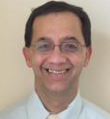
Achintya Bezbaruah
This session will focus on various aspects of bio-based nanomaterials and processes. Areas to be addressed include ongoing research and development and the research needed to develop safer and more sustainable advanced bio-based materials; methods to manufacture those materials; and their applications in the creation of new and or improved commercial and consumer products. Principles of Green Chemistry, Safer-by-Design, and Sustainability that can be applied to the full life cycle of an advanced material will be explored. This session will share state-of-the-art experimental and modeling efforts related to bio-based product and processes.
Nanoscale Modeling for Products and Processes
Session Chair: TBA
The role of theory, modeling, and simulation in nanoscience is central to the development of safe and sustainable nanomaterials and processes. In addition to discussing the current achievements, the fundamental intellectual and computational challenges to be addressed to achieve the full potential of theory, modeling, and simulation will be debated in this session. Presentations elucidating the achievements and challenges associated with scalability algorithms with particle number or dimension as well as the need for computing resources for nanoscale modeling are welcome.
AI and Nanotechnology
Session Chair: Dr. Barbara Karn, Sustainable Nanotechnology Organization

Barbara Karn
In the early days of nanotechnology, as with all new technologies, there were questions about its safety, sustainability, equity, as well as other societal and philosophical questions. Many of the same questions are now being asked about Artificial Intelligence (AI). This session will provide an introduction to AI as it relates to sustainable nanotechnology. Research papers are invited that cover AI in improving instrumentation for nanotechnology analysis, e.g., “decompressing” data sets for more accurate outputs, designing new sustainable nanomaterials or improving on existing nanomaterials to make them more sustainable, and using AI to minimize energy consumption, reduce waste generation, and adding environmental considerations to the manufacture of nanomaterials and their products. We anticipate pairing nano and AI will become routine in future sustainable nano research.
NanoTox
Session Chair: TBA
Our understanding of how engineered nanomaterials in consumer products, the workplace, and the environment might impact human and the other ecological components has grown considerably over the last decades. The looming challenge in this field is addressing the complexity of exposure from the point of manufacture through disposal and developing strategies to incorporate information from many diverse sources. This session will focus on the latest advances in the nanomaterials risk assessment process and will include topics such as incorporation of adverse outcome pathway analyses, the use of in vitro findings, biomarker discovery, and the use of machine learning to support hazard evaluation.
Poster Session
Session Chair: Dr. Illya Medina Velo, Houston Christian University
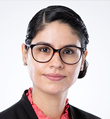
Illya Medina Velo
Posters in all areas of sustainable nanotechnology are encouraged. The poster session will offer a unique opportunity to students, post-doctoral fellow, young and senior research to interact in an informal and relax setting. There will be student poster awards.